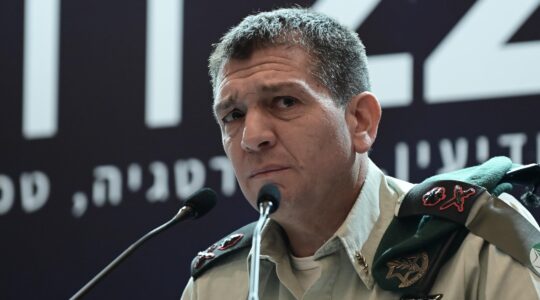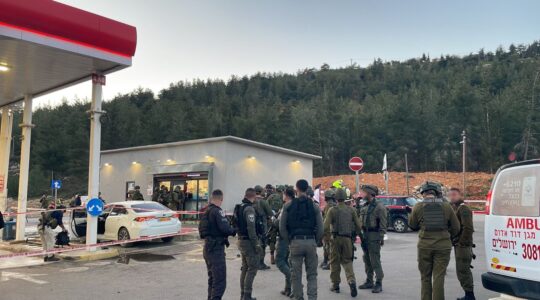RAMALLAH, West Bank (JTA) – The thorny question of Israel’s West Bank settlements has dogged President Bush’s overarching message during his eight-day tour of the Middle East: Democracies must unite to confront terrorism.
In language that is unusually blunt considering his warm relations with Israel, Bush has made clear his frustration with Israel’s failure so far to deal with outposts, or unauthorized new settlements.
“In terms of outposts, yeah, they ought to go,” the U.S. leader said, standing alongside Israeli Prime Minister Ehud Olmert Wednesday after a day of meetings. “Look, I mean, we’ve been talking about it for four years. The agreement was, get rid of outposts, illegal outposts, and they ought to go.”
In response, settlers said they would expand two existing outposts and pledged to add another. Whether they had done so in the day since Bush made his pledge was not clear, but the president was able to view outposts Thursday on his way to talks with the Palestinian Authority. One, near Beit El, was fronted by a sign – in place long before the Bush visit – that stated: “We have returned to our home established 3,800 years ago.”
Bush needs progress in Israeli-Palestinian peace to nudge forward his twin visions of democratizing the Middle East and diminishing the influence of Iranian theocrats. His sole speech in the region will be in Abu Dhabi Sunday, when he will press his case for greater liberties in the region – in the emirate that faces Iran across the Persian Gulf.
For years Israel, pro-Israel groups and neoconservatives have been telling Bush that promoting stability in the broader Middle East was not necessarily contingent on Israeli-Palestinian peace.
If he ever believed that message, it is clear he is now retreating from it. With just a year left in his presidency, he is eager for a legacy better than the Iraq morass.
Israeli foreign ministry officials said they re-delivered the message in meetings, telling Bush that nudging Arab states toward accommodating Israel was perhaps more achievable in the short term.
But Bush wants the outline of an agreement in hand before he leaves office.
Speaking Thursday in Ramallah, standing alongside Palestinian Authority President Mahmoud Abbas, Bush was unequivocal: Palestinian independence was not as intractable a goal as some would have it.
“Now, look, there are some in the world who don’t believe in the universality of freedom,” he said. “I understand that. They say, like, freedom is OK for some of us, but maybe not all of us. I understand it, but I reject it. I believe in the universality of freedom.
“I believe, deep in the soul of every man, woman and child on the face of this earth is the desire to live in a free society. And I also believe free societies yield peace. And, therefore, this notion of two states living side by side in peace is based upon the universality of freedom, and if given a chance, the Palestinian people will work for freedom.”
Later in the day he reiterated that view, summarizing his two days of meetings with Israeli and Palestinian leaders.
“The establishment of the state of Palestine is long overdue,” the U.S. leader said at the King David Hotel in Jerusalem. “A peace agreement should happen and can happen by the end of this year.”
Bush reiterated calls for the parties to adhere to the “road map” peace process he launched in 2003, calling on the Palestinians to stop terrorist attacks and create a secure environment for Israel. And he called on Israel to end settlement expansion and remove illegal outposts.
He said the parties must address all the core issues. On borders, he reiterated one of the principles of his 2004 letter to then-Israeli Prime Minister Ariel Sharon, saying “any peace agreement will require mutual adjustment to the 1949 line.” This was widely seen at the time as an acknowledgement that Israel would retain some of the areas beyond the 1967 borders.
At the same time, he said a Palestinian state must be contiguous.
Bush also said the Palestinian refugee issue should be addressed by “new international mechanisms, including compensation.”
Bush said the agreement “must establish Palestine as a homeland to the Palestinian people just as Israel is a homeland to the Jewish people.”
Bush did not let the Palestinians off the hook during his visit. While in Ramallah with Abbas, the president said he understood why Israelis want to keep in place the roadblocks and checkpoints that frustrate Palestinian travel.
“I can understand why the Palestinians are frustrated driving through checkpoints,” he said. “I can also understand that until confidence is gained on both sides, why the Israelis would want there to be a sense of security. In other words, they don’t want a state on their border from which attacks would be launched. I can understand that. Any reasonable person can understand that.”
Abbas, standing beside Bush beneath portraits of himself and his late predecessor, Yasser Arafat, beamed – and understood.
“We are fully satisfied with the outcome that we reached through this visit of Mr. President George Bush,” he said. “All the issues are in agreement. We are agreed on all topics. All topics are clear.”
Bush also urged Israel to clear the way for a Palestinian security force.
“By any obvious measure, the Palestinian security forces are improving,” he said at the news conference in the “Muqata,” the P.A. headquarters leveled by Israel during the second Palestinian intifada from 2000 to 2004 and rebuilt in part with U.S. assistance.
“My message to the Israelis is that they ought to help, not hinder, the modernization of a Palestinian security force,” he said.
Israel has prevented P.A. security forces from receiving some equipment. It wants assurances that the forces is fully professional, noting the involvement in the past of some P.A. troops in attacks on Israel.
Bush’s message on the outposts was a jarring moment in an Israel trip that has otherwise been a love fest between Bush and Olmert. The Israeli prime minister appeared so taken aback that he rushed to say – in Hebrew – how much he trusted Bush and how he would act soon on the settlement issue.
“Thank God I can conduct political negotiations with George Bush at my side as one of my partners,” Olmert said, elevating the U.S. status from arbiter to peace partner. “Thank God we can conduct political negotiations when the largest and most important power in the world, and the most important for us, is headed by such an important friend of Israel.”





